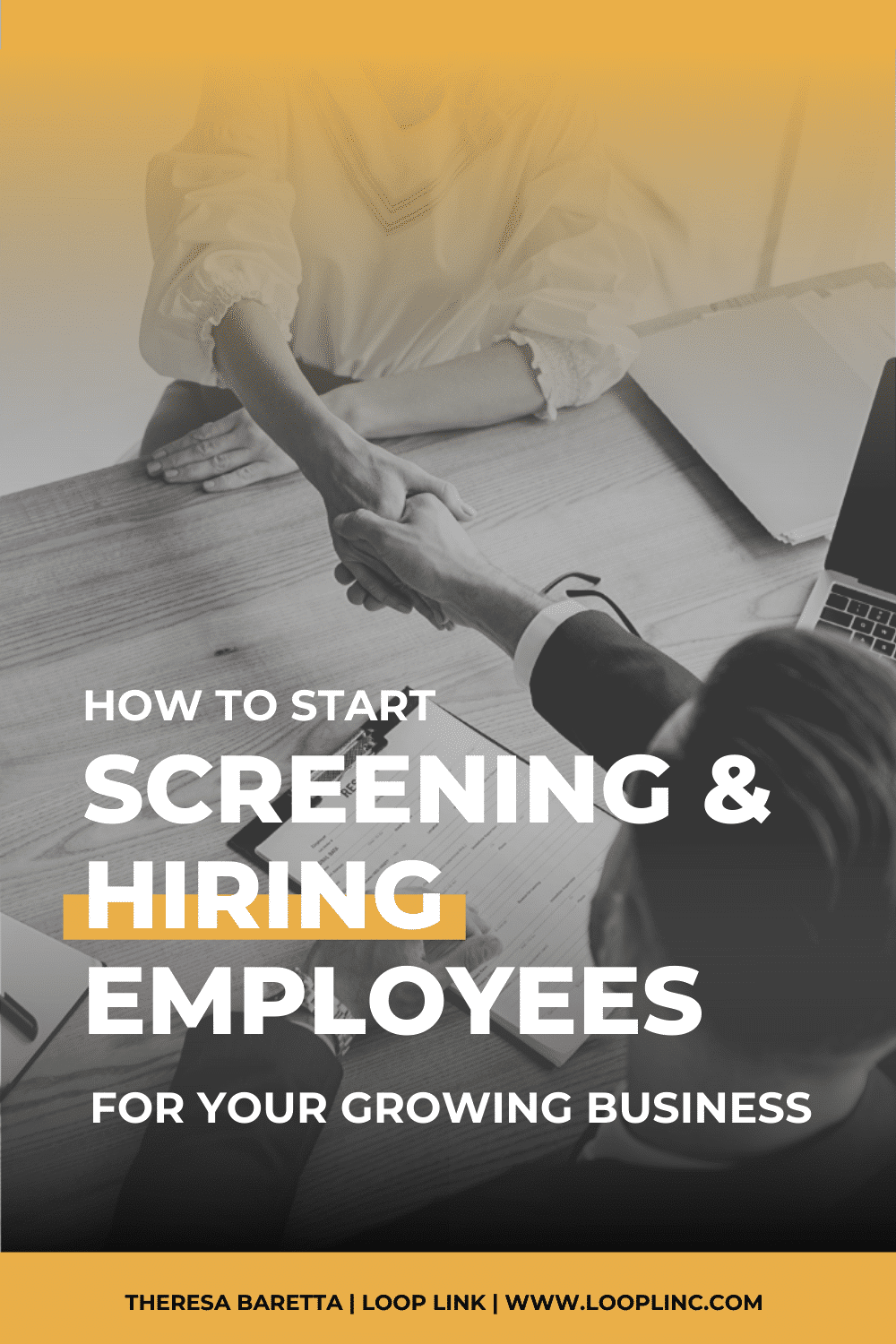Hiring your first employee? That’s a good indicator that your business is growing! As a small business owner, your early hires matter. A QuickBooks survey of small businesses showed that 3 out of 4 of every first hire are still with those employers till today. When you find the right people, you can build a team that will keep your business on track and scale towards your growth vision.
The hiring process comes with a lot of responsibility. When you finally say the words, “You’re hired” to someone, you want to be sure that they are the best choice for your business. To help you through this process, I’ve gathered all the advice I can share from experience. Here’s how to start the screening and hiring process.
Screening and Hiring your First Employees for a Small Business

Outline your Top Hiring Need
As expected, there will be a lot of areas you need help. However, for your first hires, you need to narrow down that list to the top few. It’s quite simple to make this decision. Take stock of your business to find out which position will make a significant impact on your business once it is filled.
For example, do you have a lot of inquiries coming in with limited customer service help? If you hire a customer service person, you could start to retain more leads and make more sales. Do you need help with the small tasks that eat at your day? Hiring a personal assistant may take a massive load off your back and allow you to focus better on business development. The first positions you fill should be need-specific.
Be intentional with your Recruitment Process
The people you hire will form the human framework of your business. They will eventually shape your company culture and set the pace for employees who will come in after them. You need to find good employees. To do this, you should take an intentional approach.
Before you send ads into the void of job boards, take a look around. Is there someone who you’ve always admired their work ethic, and would love to have them on your team? They could be anyone from the waitress at a small restaurant to the worker at your local supermarket. They could also be someone who did a one-time job for your business in the past.
You can also ask within your professional network for recommendations. There’s a good chance that someone knows the right person for your role. If you’re looking for specialized workers, then job boards may be your only option. Create detailed descriptions and add as many filters as possible. Include open-ended questions that can quickly tell if someone will be a good fit for your company or not.
Create relevant Interview Questions
Toss out that cliche list of “20 questions to ask during a job interview”. Ask questions that are relevant to the position. As a small business owner, you’ve probably handled most of these tasks by yourself for a while. Ask personalized questions that will tell you if a potential employee is equipped for the challenge. If they need to use a lot of software to get the job done, ask about their proficiency with technology. If the job is intensive, ask them if they can function under pressure. If they somehow have to interact with animals to get their job done, make sure that your final choice loves animals.
Avoid asking questions that require a yes or no answer. Ask open-ended questions instead. Get a feel for their character to determine if they will be a good fit at your company or not.
Focus on potential rather than experience
As a small business, you probably don’t have the budget to attract top-skilled applicants. And that’s okay. In your early stages, you should be more interested in hiring people with promising potential. Look out for applicants who share passions and interests similar to what your business is about.
Their missions should be similar to yours. As far as experience is concerned, except if you’re hiring for highly specialized positions, you can teach them what they need to know. You need people who can learn and adapt quickly.
Provide a Skill Test
There are countless online guides on hacking interview questions. Applicants know the right answers to match every question you may throw at them. Instead of evaluating candidates on their answers alone, introduce a skill test.
If you’re hiring for a marketing position, give the applicant a brief and ask for a strategy idea. If you’re hiring a software developer, find a developer in your network to administer a test. Beyond the specific specialized skill, also test their problem solving, time management, and communication skills. These are all essential for working in a small company.
Personalize the Onboarding Process
While your team is still small, you have the opportunity to personally handle the onboarding process. This process involves providing new employees with all the information they need to integrate with your team. Talk to your new hires about company policies, your mission, and your vision. Give them a clear idea of the behavior and attitude to work which is expected.
The most important aspect of onboarding is leading by example. While your new employees are listening to your words, they are also watching how you interact. The way you treat employees, handle company resources, talk to clients, and so on, sends a message.
Ensure that your words match your actions. Set high expectations, but make it easy for your new hires to reach out with questions they may have. If you have one or two existing employees, assign them as ‘buddies’ for the new ones. Questions can be directed to their buddies as needed.
Check all legal boxes
Finally, you want to be sure that your company stays within all employment regulations. Prepare an employment contract with the help of a lawyer. Consult with an accountant on your payroll taxes. They can help you sort out details such as insurance, retirement packages, and so on.
Conclusion
With the right strategy and some patience, you can build a team of reliable employees for your small business. While screening and hiring, don’t hesitate to ask for advice within your professional circle. You can avoid a lot of errors by learning from others. Be sure that you’re ready for the responsibility before taking this big step.
Your Move
Unsure how to implement these solutions within your team?
Do you need an extra hand with team management?








